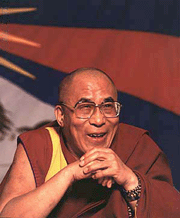|
Venerable Tezin Gephel's Speech on
Amnesty International's Day of Action
(November 19, 2002)
I am honored and happy to be here to share some thoughts with
you. My talk is about kindness and compassion, which the Dalai Lama says are
essential for universal peace, for the very simple reason that kindness and
compassion are the ultimate sources of happiness.
The purpose of life is for all animals and human beings to be happy, because the
desire to avoid suffering and have happiness is innate in all sentient beings.
Tibetan Buddhists refer to this basic principle quite often to cultivate the
altruistic intention and follow the path of compassion in order to work for the
happiness of others.
We all agree on these two fundamentals of life: we want happiness; we do not
want suffering. The problem with such a simple idea is that we take it for
granted and do not look deeply enough into how we, as individuals, can achieve
true happiness and diminish suffering.
Once we human beings are born we are not sent to a factory to obtain the feeling
that we want happiness and do not want suffering. We are born with it. That’s
why, by nature, we seek happiness and avoid suffering. All sentient beings are
unquestionably alike in this respect. Everything we have done in the past and
everything we are going to do in the future will be motivated by the desire to
achieve happiness in our life.
The big question is: why is there so much suffering and conflict in the world as
a whole, as well as in our individual lives? This is because we are trying to
achieve happiness the wrong way. Even though by nature we want happiness,
through the force of ignorance (or lack of knowledge) we destroy our own
happiness as if it were our enemy. By our very nature, we do not want suffering,
but we foolishly pursue suffering practically every day in spite of ourselves
and others. This occurs whenever we act to satisfy our likes or dislikes, act
out of anger or hatred, or out of unwise self-interest. From a global
perspective, the promotion of mass weapons of destruction, violations of human
rights, and environmental crises (such as the pollution of air and water) cause
suffering of great magnitude. Whether we are looking at the day-to-day or the
big picture, the source of suffering is within the individual. Only by taking
responsibility for our day-to-day actions by training our minds to treat others
with kindness and compassion can we hope to alleviate universal suffering.
We human beings, and of course all sentient beings, have the right to pursue
happiness and live in peace. No one has the right to inflict suffering on
others. No one has the right to force other beings to live a life of unnecessary
suffering. Aggressive and hateful thoughts and behaviors are abusive and against
human nature. Nevertheless, such behavior occurs every day and begins to seem
normal whenever we are extremely addicted to our own happiness and regard our
personal happiness as more important than that of others. If we smoke a lot or
take drugs we may obtain a short amount of happiness in the immediate situation,
but ultimately such behaviors can bring tremendous suffering and shorten our
lives. Similarly, inflicting suffering upon others might bring us some temporary
benefit, but in the long run we end up surrounded by more enemies and suffer
greater fear, anxiety, and suspicion. These results indicate how little we know
about the true nature of happiness and point to the fact that peace of mind and
contentment are rooted in happiness.
A true sense of happiness does not come from a limited and narrow-minded concern
for our own welfare and the few people (or pets) who are dear to us. It comes
from extending love and compassion to all sentient beings. Love here means
wanting everybody to find happiness; compassion means wanting everyone to be
free from suffering. This altruistic attitude allows us to be truly open in our
concern for others. This is the foundation for peace.
In December of 1989 the Dalai Lama, speaking at Oslo University, said:
“Responsibility does not only lie with the leaders fo our countries or with
those who have been appointed or elected to do a particular job. It lies with
each of us individually. Peace… starts within each one of us.
Thank you.
Read another speech, on the anniversary of
September 11,
given by Venerable Gephel-la (Namgyal
Monastery site)
[
Buddhism
| Activism
| Spirituality
| About Us
| Links
] |
